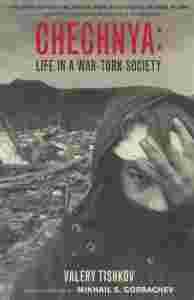|
____________
With a foreword by Mikhail S. Gorbachev
Wydawnictwo University of California Press. Berkeley - Los Angeles - London 2004
Stron 302
Książka w języku angielskim
Stan dobry. Ślady po zagięciach na niektórych stronach. Bez podkreśleń w tekście.
Zobacz na innych moich aukcjach pozostałe podobne pozycje!
____________
|
DARMOWA WYSYŁKA W POLSCE PRZY JEDNORAZOWYM ZAKUPIE NA MINIMUM 7 AUKCJACH !!!
(z wyjątkiem przedmiotów o wartości mniejszej niż 2,50 zł)
ZOBACZ POZOSTAŁE AUKCJE !!!
ZAKUP NA KILKU AUKCJACH - JEDEN KOSZT WYSYŁKI (jak przy aukcji, na której jest on najwyższy).
OPCJE WPŁATY:
1) PayU - najsprawniej i najbezpieczniej (kartą Visa, Master Card lub e-przelewem),
2) Na konto bankowe
WYSYŁKA INPOST, EWENTUALNIE DO MNIEJSZYCH MIEJSCOWOŚCI POCZTA POLSKA.
International customers
SHIPPING WORLDWIDE
|
| This book illuminates one of the world's most troubled regions from a unique perspective—that of a prominent Russian intellectual. Valery Tishkov, a leading ethnographer who has also served in several important political posts, examines the evolution of the war in Chechnya that erupted in 1994, untangling the myths, the long-held resentments, and the ideological manipulations that have fueled the crisis. In particular, he explores the key themes of nationalism and violence that feed the turmoil there. Forceful, original, and timely, his study combines extensive interview material, historical perspectives, and deep local knowledge. Tishkov sheds light on Chechnya in particular and on how secessionist conflicts can escalate into violent conflagrations in general. With its balanced assessments of both Russian and Chechen perspectives, this book will be essential reading for people seeking to understand the role of Islamic fundamentalist nationalism in the contemporary world.
________
“A valuable complement to the other available studies on the topic.”—Marcia L. Sprules Library Journal
"The accounts of a wide range of people involved in the war . . . are the book's strength, and what marks it out from other studies of the conflict."—Irish Times
"This book, though controversial in perspective, is an anthropological tour de force. Through detailed description, Tishkov enables readers to see behind the banal generalities around such terms as self-determination. The book puts a foreign world--ethnic and national violence--under a microscope and reports on those details that are unfortunately lost in all too many informed discussions."—David D. Laitin, author of Identity in Formation: The Russian-Speaking Populations in the Near Abroad
"Non-Russian students of ethnicity have long admired Valery Tishkov as a supremely knowledgeable specialist in the subject, an acerbic critic of careless description, and a superb organizer of research. Here, however, we discover a sympathetic observer, historical analyst, and concerned citizen who deplores war's destructiveness. Tishkov brings Chechen voices to eloquent witness against sham and obfuscation."—Charles Tilly, author of Durable Inequality
"This is a most valuable book on an important subject about which Americans know little. I recommend this book to anyone interested in the all-important U.S./Russia relationship as well as to general students of international affairs."—Thomas Graham Jr., former U.S. ambassador and author of Disarmament Sketches: Three Decades of Arms Control and International Law
"This book confronts the difficult question of why such conflicts arise—why do people who have lived side by side start killing one another? Some explain this in terms of history, citing innate hatred, the incompatibility of civilizations, or the unusual social structure of the rival nationalities. Some say the war in Chechnya was bought and paid for. But the question remains of why it is so easy to lead a society into conflict: why people take up arms or find themselves unable to oppose the initiators and perpetrators of violence. Tishkov's explanation has important theoretical and political significance and deserves the attention of an international audience." —from the foreword by Mikhail S. Gorbachev
________
Contents
Foreword by Mikhail S. Gorbachev
Preface
1. Ethnography and Theory
2. Indigenization, Deportation, and Return
3. Contradictory Modernization
4. Chechen Images
5. The Road to War
6. Dzhokhar: Hero and Devil
7. The Sons of War
8. The Culture of Hostage-Taking
9. Violence in Secessionist Warfare
10. The Impact on Family Life
11. Religion and the Chechen Conflict
12. The Myth and Reality of the "Great Victory"
13. An Ideology of Extremes
14. Chechnya as a Stage and a Role
Conclusion
Notes
Main Characters
Research Partners, Informants, and Cross-Reviewers
Select Bibliography
Index
______
Valery Tishkov is Professor of History and Anthropology and Director of the Institute of Ethnology and Anthropology at the Russian Academy of Sciences. He has published many books in Russian and is also the author of Ethnicity, Nationalism, and Conflict in and after the Soviet Union: The Mind Aflame (1997). |

